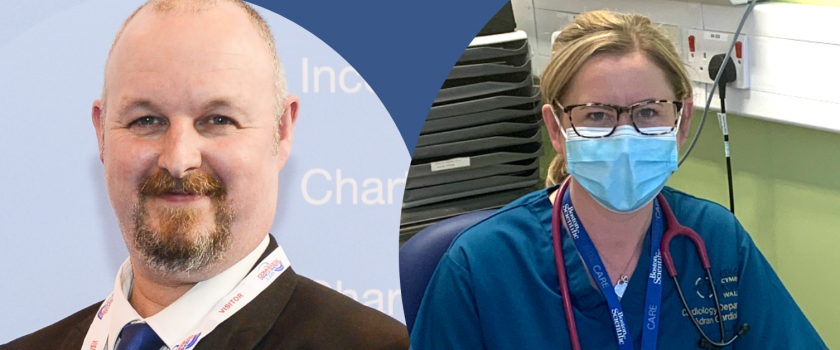Flintshire patient thanks new Syncope Clinic at Wrexham Maelor Hospital for ‘amazing care’

A man from Flintshire has praised a new Rapid Access Syncope Service at Wrexham Maelor Hospital, which has reduced appointment waiting times for people who suffer from blackouts from 12 to four weeks.
Syncope or transient loss of consciousness (T-LOC), more commonly described as a blackout, affects approximately 42% of the population at some point during their lives.
Syncope is commonly due to undetected heart conditions causing cardiac arrest and sudden death.
The service, the first to offer a dedicated Rapid Access Syncope Clinic in North Wales, opened the weekly clinic for face-to-face referrals in August 2020 and has reduced the appointment waiting times for patients by 66%.
Ian Millington, 53 from Mold, was referred to the clinic by his GP following a sudden blackout.
Within three weeks Ian attended an appointment which found an abnormality on his heart tracing and shortly after he had a cardiac loop recorder implanted to monitor his heart.
A month later Ian had a second blackout and was seen that day at the clinic.
His cardiac monitor revealed that his heart had stopped for 32 seconds, causing him to lose consciousness.
Ian was admitted to the cardiac ward and underwent a pacemaker implant the next day to stop this happening again.
He was discharged that evening having only spent one night in hospital.
Ian, a Technical Team Leader for the Driver and Vehicle Standards Agency, said: “I was absolutely stunned my heart had stopped for 32 seconds, the loop recorder was incredible, when it was fitted I didn’t feel a thing and it records your heart 24/7.”
“The care I received was amazing I don’t know what I did to deserve it.”
“After my first blackout the doctors were concerned about me driving, which could have had a significant impact on my job as I drive round to nine different sites, but my employer was great and let me work from home when I had the loop recorded fitted and thankfully when I had the pacemaker fitted it meant I could drive again.”
“The pacemaker has been absolutely life changing, I was home within a day and was back to work the following week.”
“I don’t think I realised how ill I was until I felt better again, I’m sleeping better and I’m more alert.”
”If there was a delay in my treatment I dread to think what would have happened but I don’t think I would still be here. I couldn’t thank the clinic and all the doctors enough for their care.”
Many patients suffering from T-LOC will have some diagnostic tests done and cardiac monitors fitted on the same day of their consultation.
With the support of cardiac physiologists, the service has reduced cardiology consultant clinic workload by approximately 200 new patients a year, plus the associated follow-up appointments.
Sally Owen, Chief Cardiac Physiologist at Wrexham Maelor Hospital, who led the initiative, said: “The clinic has reduced the wait times for patients significantly and reduced cardiology consultant clinic workload.”
“Patients who require invasive cardiac monitoring are often given a date for the procedure on the day of their appointment, and the physiologists would routinely implant and hold follow ups, ensuring patients have continuity of care. ”
“The service, although in its infancy, has already had a positive impact on patient care, and it’s great to see how this clinic has helped change people’s lives like Ian’s.”
The service was set-up in response to the 2019 European Society of Cardiology (ESC) guidelines which advised that patients presenting with T-LOC at GPs and Emergency Departments to be rapidly referred to specialist syncope clinics.
Spotted something? Got a story? Email: [email protected]
Latest News
